Humankind has been trying to solve the mystery of dreams for as long as they’ve existed. Today there is even a special discipline in the study of dreams called oneirology. Those who prefer the esoteric side of things over science love to interpret their dreams according to various dream books and believe that they can predict the future. But psychologists think that dreams accurately reflect our current condition and that our subconscious tries to tell us something important via dreams from time to time.
We at Bright Side have learned that there are dreams that are common for all of us. Each of us sees these types of dreams every now and then. These dreams are caused by our ancient instincts, a cultural code, the experience of our ancestors, and personal experience. A psychologist and an expert in the field of dreams, Patricia Garfield, calls them “universal dreams” and says, “Like a hearty stew that is rich with local produce, the universal dreams differ among different peoples, but they are all nourishing variants of the same wholesome meal. They are as old as humanity and as widespread as our globe.”
1. Falling

In adulthood, we see falling more often than flying. According to the psychologist Ian Wallace, a dream about falling symbolizes the fear of losing control. You can’t control something in your life anymore because some drastic changes that you were not ready for took place in your life. Think about what sphere of life (work, relationships, finances, health, etc.) you feel most suppressed or vulnerable in as well as the ways to correct it.
Some scientists explain dreams about falling with simple physiology. As the body is sinking into sleep, the nerve system starts to calm down, your blood pressure and heart rate decrease and your falling asleep brain (especially if it was overwhelmed during the day) can perceive this physiological change as danger or an approaching death and therefore, makes you wake up suddenly.
The opposite version of this dream is flying which signifies freeing oneself from some hard burden and getting the desirable freedom.
2. Teeth that fall out and injuries

Our subconscious interprets teeth as an indicator of strength, and an ability to “bite off” a piece of the world. “Perhaps, you have recently been feeling unarmed and helpless in the real world,” Penney Peirce explains.
Patricia Garfield, another expert who’s studied dreams for many years, connects dreams about teeth falling out with hidden anger. As a rule, when we suppress anger, we clench our jaw, and our teeth might start to creak and grind. This dream might be signaling that it’s high time to get rid of negative feelings.
We often have dreams where someone close to us is wounded or sick. Those dreams cause consternation; however, from psychology’s point of view, things are not that bad. It’s simply our fears of the future and inevitable changes with those close to us. If you see your own death, it means that some part of you is dying and staying in the past to give space to something new.
“Opposite” dreams about birth and recovery usually appear when something new is taking place in a person’s life (like a new job or project) and symbolize a new experience.
3. Failure at an exam or public performance

You’re about to take an exam and suddenly realize that you don’t remember anything or you can’t say a word when standing in front of a big crowd. These dreams might be experienced not only by students and school kids but also by people who have graduated a long time ago. It’s likely that you had some stress shortly before going to sleep or was extremely worried about something. In this case, it’s better to take a short break and relax.
4. Being chased or persecuted
Such dreams have several different meanings. An expert in the field of dreams named Lauri Loewenberg says, “People that tend to avoid conflict, who are afraid of ruffling feathers or causing issues will have the recurring dream of being chased.”
Pay attention to the thing chasing you — they symbolize an unpleasant feeling or situation that you try not to think about in real life. It can be debt or addiction. Are you chased by a person you know? Think about what or who you associate this person with. They might indicate some other person or even a part of your personality that you don’t want to admit (like a hidden talent or aspiration) in your dream.
There’s also a theory saying that dreams about running away from someone are simply the echoes of primitive instincts that are in our genes thanks to our ancestors. All because they were constantly running from predators.
5. Inappropriate clothes or an absence of any
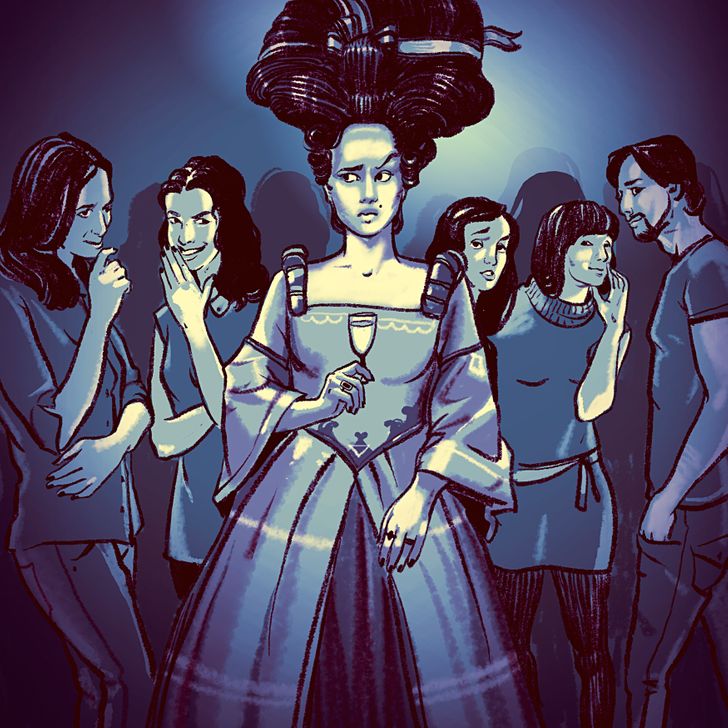
In your dream, you turn up in a public place wearing inappropriate clothes or not wearing anything at all. In this situation, it’s important to pay attention to the feelings you encountered in your dream. These dreams are usually followed by a feeling of shame and embarrassment.
Psychologist Ian Wallace notes, “It means that you feel vulnerable at your new job or in your new relationship and are afraid that others will learn about your weaknesses and disadvantages.” However, if you don’t feel any shame in your dream but instead feel proud of yourself, the dream has the opposite meaning. Perhaps you feel a lack of recognition and admiration and would like others to see your talents as well as your personality more.
6. A catastrophe or an apocalypse
We’ve all dreamed about natural or man-made disasters where we’re scared for our own lives and the lives of those close to us. These dreams might indicate personal problems that have gotten out of control or are a result of feeling threatened by something. Of course, constant messages in the media about catastrophes and terrorist acts worsen the situation. As a result, we start feeling vulnerable in the modern world.
Sometimes, when having a nightmare, we try to shout out loud but feel that our voice has left us, which causes an even bigger fear. Psychologists explain it as sleep paralysis. During the last phase of sleep, when we have dreams, our brain purposefully paralyzes the body so that we can lie still and not “live” in our sleep by running, jumping, etc. People who have sleep paralysis usually wake up before the end of the last phase and enter a state between sleep and reality for a short period. This can be felt as an inability to move, speak, and, in some cases, breathe.
7. Faulty equipment or vehicles
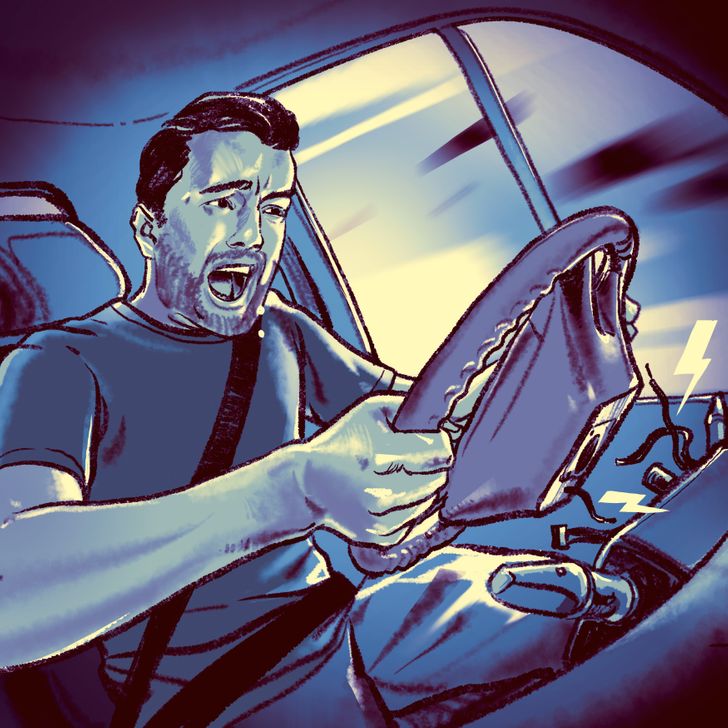
You try to use some gadget or device, and it breaks right away. For example, your phone stops working, and you can’t call anyone. According to Patricia Garfield, these dreams are more often experienced by women and symbolize worries about relationships or losing an emotional connection with someone.
Dreams in which you’re trying to operate a vehicle that doesn’t work properly or breaks down are in the same category. You are likely missing support and can’t cope with a difficult life situation by yourself.
8. Pregnancy

As strange as it might sound, it’s not only women who can have dreams about pregnancy. A psychologist name David Bedrick says, “Pregnancy symbolizes something new growing inside us.” You subconsciously dream about “giving birth” to a new fascinating creative project. It can be anything from writing a book to repairing a house. It’s time to set a goal and show the world how you can take on this new role.
If you’re not pregnant in real life, you may be seeking fulfillment after having such a dream.
9. Being late
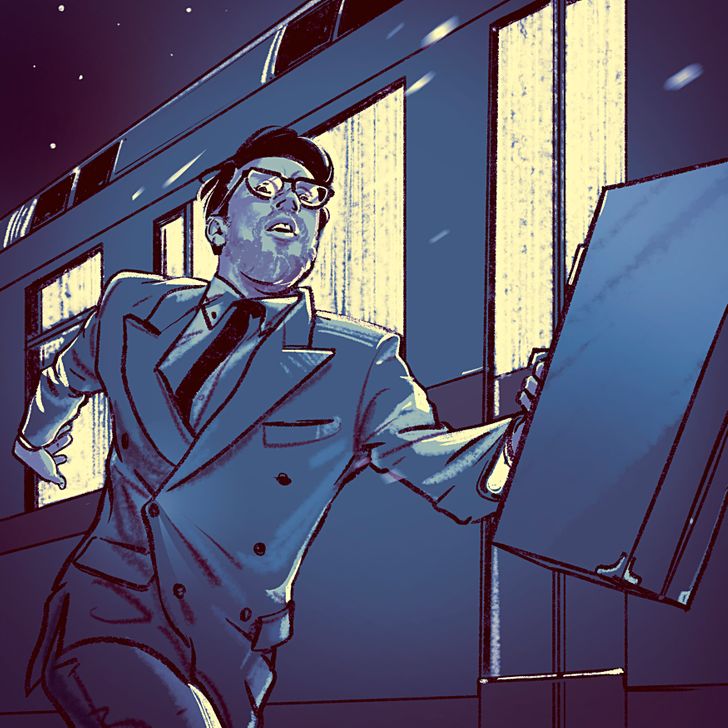
Dreams that have you running after a departing train or running late for an important meeting can occur quite often. According to a dream expert, Michael R. Olsen, they can symbolize the fear of missing out on something very important in your relationships or in the upbringing of your child, for example. If you’re constantly overwhelmed and don’t have much time to accomplish things in real life, your subconscious is signaling that it’s time for you to reconsider your schedule and free up time for really important things.
10. An unknown room
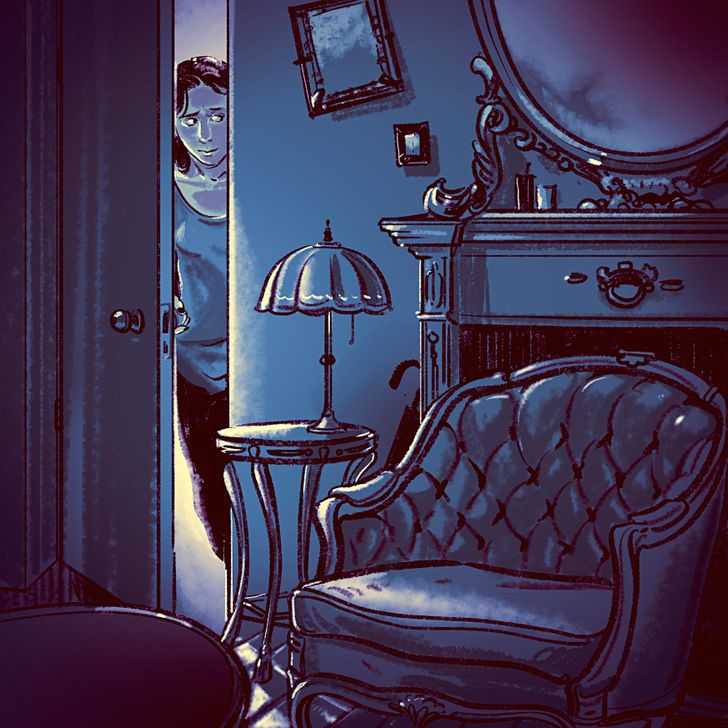
Dreams about new rooms are about self-knowledge. If you find yourself in an unknown house in your dream, it means that you don’t know yourself well and try to neglect some sides of your character. A separate unfamiliar room symbolizes that you have a hidden talent, skill, or opportunity that you don’t use.
A psychotherapist named Eddie Traversa thinks that we subconsciously associate some rooms with certain processes. A kitchen is a place where products get transformed into a finished dish which means that you’re currently going through some inner changes. A bathroom is a symbol of freeing oneself from unnecessary baggage. It might symbolize that it’s time to get rid of something that is not needed any longer. A bathroom is a symbol of cleansing and it means that you feel the necessity to clarify things or see them in a different light. A bedroom signifies the things that worry you in your romantic relationship.
Have you ever experienced any of these dreams or do you usually see something different? Please tell us about it in the comments!
Alguém continuou jogando ovos na lápide do meu marido – Um dia, eu vi quem era, e isso quase destruiu minha vida

Todo domingo, eu visitava o túmulo do meu marido para me sentir próxima dele, até que encontrei ovos crus esmagados contra sua lápide. No começo, pensei que fosse uma brincadeira cruel, mas quando peguei o culpado em flagrante, fiquei arrasada ao descobrir que era alguém em quem eu confiava mais do que em qualquer outra pessoa.
Perdi meu marido, Owen, há um ano. Foi repentino. Sem avisos, sem tempo para se preparar. Um ataque cardíaco o roubou de mim, assim, do nada. Vinte e cinco anos juntos, se foram em um momento.

Uma mulher chorando | Fonte: Pexels
Por meses, senti como se estivesse caminhando pela névoa. Tudo doía. Tentei manter as coisas sob controle para nossos filhos, mas por dentro eu estava desmoronando. Todo domingo, eu visitava seu túmulo. Virou meu ritual, minha maneira de me sentir próxima dele.
O cemitério estava tranquilo. Quieto. Só eu, Owen e as flores que eu levava toda semana. Parecia que eu podia respirar ali. Mas três meses atrás, algo mudou.

Um cemitério de inverno | Fonte: Pexels
Na primeira vez, pensei que estava vendo coisas. Cascas de ovos. Gema amarela manchada na base da lápide de Owen.
“Por que alguém faria isso?”, sussurrei para mim mesmo, agachando-me para limpá-lo. Continuei olhando por cima do ombro, pensando que talvez fossem apenas crianças pregando uma peça cruel.

Uma lápide coberta de ovos | Fonte: Midjourney
Limpei-o, pensando que era algo único. Mas duas semanas depois, aconteceu de novo. Desta vez, havia mais ovos — pelo menos seis. Quebrados, pingando na pedra. Limpei-o de novo, mas meu coração estava mais pesado.
Tentei pedir ajuda à equipe do cemitério.
“Houve algum vandalismo no túmulo do meu marido”, eu disse ao homem na recepção. Ele parecia entediado, mal olhando para cima.

Uma mulher triste conversando com um homem em um escritório | Fonte: Midjourney
“Você pode registrar uma ocorrência”, ele disse, deslizando uma prancheta em minha direção.
“É isso? Vocês não têm câmeras ou algo assim?”, perguntei.
Ele balançou a cabeça. “Não nas seções mais novas. Desculpe.”
Mesmo assim, registrei o boletim de ocorrência, mas, no fundo, sabia que não ajudaria em nada.

Uma idosa chateada sentada na cama | Fonte: Pexels
Na terceira vez que encontrei ovos, chorei. Nem tentei esconder. Não era só a bagunça, era a sensação de que alguém estava mirando em Owen, mesmo morto.
“O que você quer dele?”, gritei para o cemitério vazio. Minha voz ecoou de volta para mim.
Não consegui dormir na noite anterior ao aniversário de sua morte. Memórias de Owen continuavam girando em minha mente. Eu podia ouvir sua risada e sentir o jeito como ele segurava minha mão quando andávamos.

Uma idosa em luto | Fonte: Pexels
Às 5 da manhã, eu não aguentava mais. Peguei meu casaco e decidi ir ao cemitério. O sol ainda não tinha nascido, e o mundo parecia parado.
Enquanto caminhava em direção ao seu túmulo, parei no meio do caminho.
Cascas de ovos. Frescas, espalhadas por aí. E uma figura.

Uma lápide coberta de cascas de ovos | Fonte: Midjourney
Eles estavam parados perto da pedra, segurando algo na mão. Um ovo. Eu congelei, minha respiração presa na garganta. O ovo se espatifou contra a pedra, o som agudo no ar calmo da manhã.
“Ei!”, gritei, minha voz tremendo. “O que você está fazendo?”
A figura enrijeceu, mas não se virou. Meu coração batia forte enquanto eu corria em direção a eles.

Uma mulher em pé em frente a um túmulo | Fonte: Pexels
Eles se viraram lentamente e minha respiração ficou presa.
“Madison?” O rosto da minha irmã me encarou de volta, pálido e com os olhos arregalados. Ela ainda tinha um ovo na mão, os dedos tremendo.
“Por que você está aqui?” ela perguntou, com a voz baixa e cortante.
“Você!” Eu rebati. “Você foi quem fez isso!”

Uma mulher furiosa | Fonte: Freepik
O rosto dela se contorceu. “Você não entenderia.”
“Experimente”, eu disse, me aproximando.
Ela riu amargamente. “Você acha que ele era perfeito, não é? O marido leal, o pai amoroso. Aquele homem mentiu para você por anos.”
“Do que você está falando?” Minha voz falhou.

Uma mulher amarga em um cemitério | Fonte: Midjourney
Os olhos de Madison queimaram nos meus. “Tivemos um caso. Cinco anos, Emma. Cinco anos. Ele me prometeu tudo — dinheiro, um futuro. Mas quando ele morreu, não ganhei nada. Nem um maldito centavo. Tudo foi para você e seus preciosos filhos.”
Senti como se o chão tivesse desaparecido debaixo de mim.
“Não”, eu sussurrei. “Você está mentindo.”

Uma mulher chocada em um cemitério | Fonte: Midjourney
“Estou?” ela retrucou. “Ele não deixou tudo para você? Você viu o testamento.”
Olhei para ela, minhas mãos tremendo. “Como você pôde fazer isso? Comigo? Com ele?”
A voz dela ficou fria. “Você não pode me julgar. Ele mentiu para nós dois. Ele fez promessas que não cumpriu.”
Eu não conseguia falar. As palavras não vinham.

Uma mulher triste e entorpecida em um cemitério | Fonte: Midjourney
Madison deixou o ovo cair no chão. “Você sempre teve tudo, Emma. A vida perfeita, o marido perfeito. Bem, ele não era perfeito.”
Eu a observei se virar e ir embora, suas palavras ecoando em meus ouvidos.

Uma mulher indo embora | Fonte: Midjourney
Sentei-me no chão úmido perto do túmulo de Owen, minha mente girando. As palavras de Madison eram como punhais. “Tivemos um caso. Cinco anos.” Como ela pôde dizer algo tão vil? Como ela pôde alegar que o homem que eu amei, confiei e construí uma vida tinha me traído daquele jeito?
Mas as dúvidas começaram a surgir.

Uma idosa atenciosa | Fonte: Pexels
Pensei nas vezes em que Owen tinha ido em viagens de negócios de última hora, sempre com uma explicação vaga. “É trabalho, Em”, ele dizia, me dando aquele sorriso fácil. Eu nunca o questionei. Por que eu faria isso? Ele era meu marido.
Depois, havia os telefonemas. Às vezes, ele saía, alegando que era “apenas um cliente”, mas sua voz era baixa, apressada.

Um homem falando ao telefone | Fonte: Pexels
E Madison. Ela sempre foi próxima de Owen. Perto demais? Eu me lembrava do jeito que ela ria das piadas dele, mesmo as que eu achava irritantes. O jeito que ela dava tapinhas no braço dele quando achava que ninguém estava olhando.
Balancei a cabeça, recusando-me a acreditar.

Uma senhora idosa abraçando uma foto | Fonte: Pexels
Meu peito doeu enquanto eu olhava para o nome de Owen na lápide. “Você mentiu para mim?”, sussurrei. “Eu realmente conheci você?”
Mal notei Madison saindo furiosa. Ela não olhou para trás, e eu não a chamei. Fiquei perto do túmulo por um longo tempo, esfregando a gema e as cascas com mãos trêmulas. Limpei até não sobrar nada além da pedra lisa.
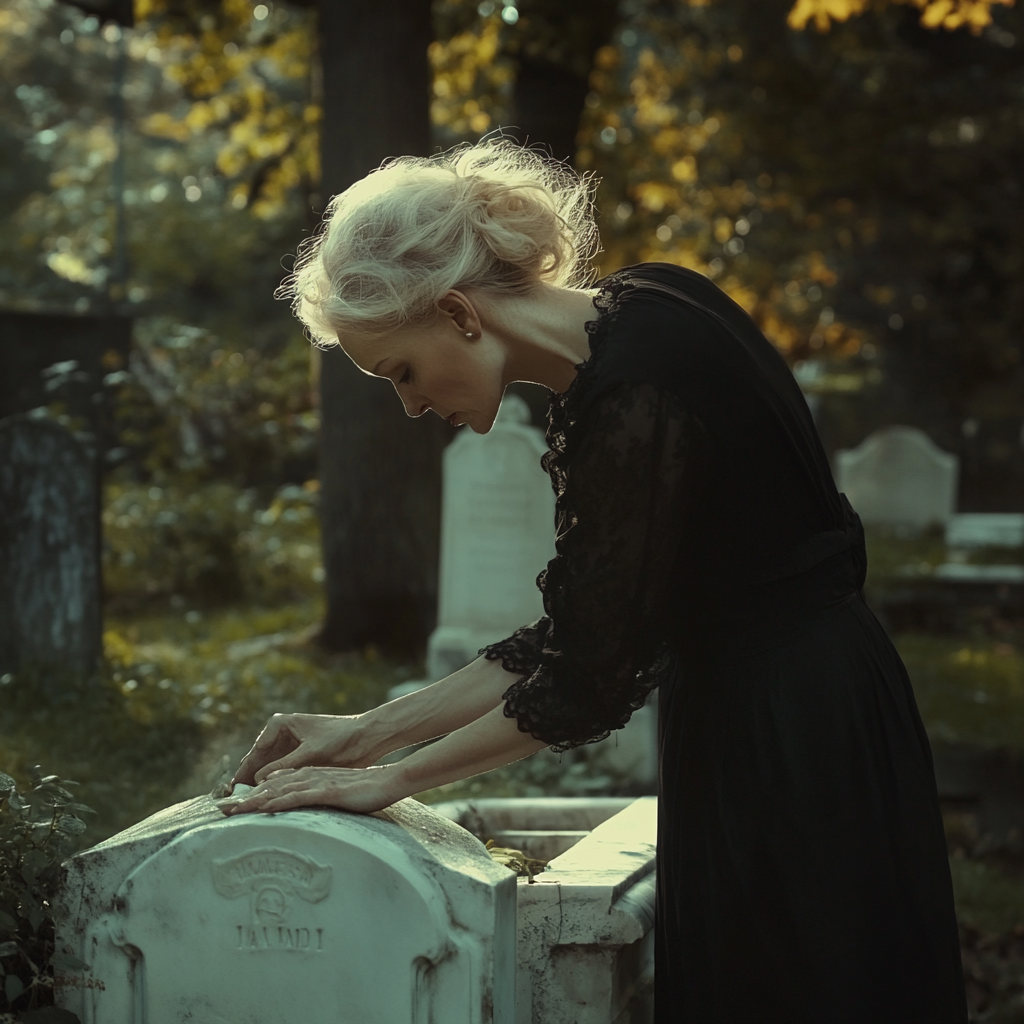
Uma mulher esfregando uma lápide | Fonte: Midjourney
Na tarde seguinte, encontrei a filha de Madison, Carly, no mercado. Ela estava segurando uma cesta de vegetais e pareceu surpresa ao me ver.
“Tia Emma”, ela disse com um sorriso. “Como você está?”
Hesitei. “Já estive melhor.”

Uma sobrinha conversando com sua tia | Fonte: Pexels
O sorriso dela desapareceu. “É sobre o túmulo, não é? Mamãe me contou o que aconteceu.”
Engoli em seco. “Carly, você sabia… sobre sua mãe e Owen?”
Ela franziu a testa, parecendo confusa. “Sabe de uma coisa?”
“Ela disse que eles… tiveram um caso”, eu disse, minha voz quase um sussurro.

Uma idosa triste | Fonte: Pexels
Os olhos de Carly se arregalaram em choque. “O quê? Não. Ela nunca me disse nada assim.”
“Ela alega que durou cinco anos. Que ele prometeu dinheiro a ela, mas—” Minha voz falhou, e parei.
A expressão de Carly mudou para algo entre confusão e descrença. “Espera. A mamãe te contou isso? Ela nunca mencionou nada sobre um caso. Nunca. Honestamente, tia Emma, isso não parece nem um pouco com o tio Owen.”

Uma jovem pensativa | Fonte: Pexels
Eu a encarei. “Você tem certeza? Ela parecia tão… certa. Ela disse que ele mentiu para nós dois.”
Carly suspirou. “Mamãe está brava há anos, tia Emma. Você sabe disso. Ela sempre disse que você tinha tudo — uma família perfeita, um bom marido, estabilidade. Ela sente que ficou presa na ponta curta do bastão.”
“Ela está com ciúmes?”, perguntei, sentindo uma pontada de culpa.

Uma mulher idosa imersa em pensamentos | Fonte: Pexels
Carly assentiu. “Não é justo, mas sim. É assim que ela vê. Mas eu nunca vi nada entre ela e o tio Owen. Nem uma vez. E se algo estivesse acontecendo, eu sinto que eu teria notado.”
Mordi o lábio. “Tem certeza?”
Carly assentiu firmemente. “Absolutamente. Mamãe pode estar dizendo isso só para te machucar. Eu odeio dizer isso, mas não me surpreenderia.”

Uma jovem confiante conversando com sua tia | Fonte: Midjourney
Fiquei olhando para ela, sem saber se deveria me sentir aliviado ou mais confuso.
Carly colocou uma mão no meu braço. “Você amava o tio Owen, não amava?”
Eu assenti, minha garganta apertada.
“Então segure isso”, ela disse gentilmente. “Não deixe a mamãe tirar isso de você.”
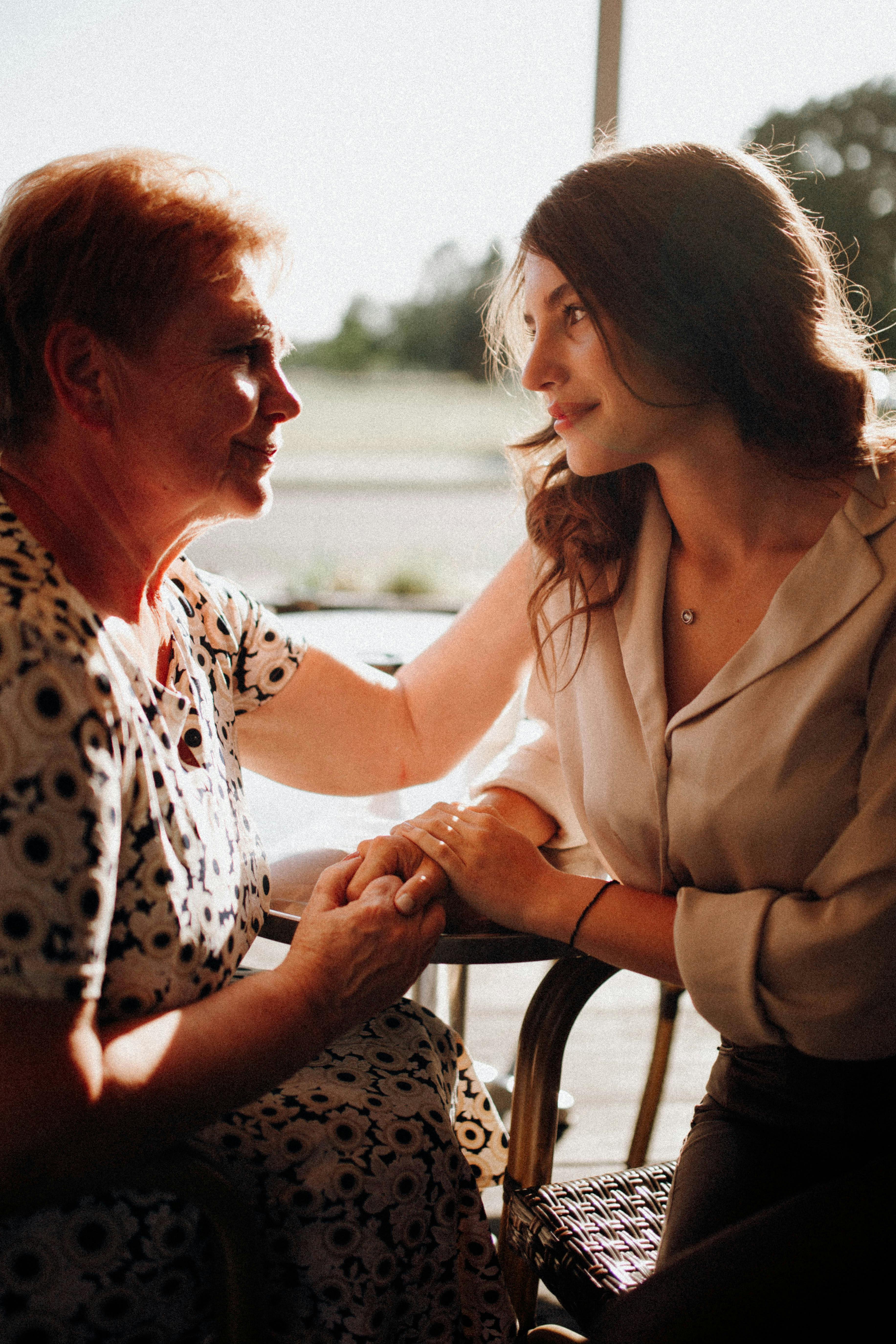
Uma mulher abraçando sua tia | Fonte: Pexels
Mais tarde naquela noite, sentei-me na minha sala de estar, olhando para uma foto antiga de Owen e eu. Ele estava sorrindo, seu braço em volta dos meus ombros. Parecíamos tão felizes.
Talvez Madison estivesse mentindo. Talvez não. Eu nunca saberia com certeza. Mas eu não podia deixar que a amargura dela destruísse minhas memórias de Owen.
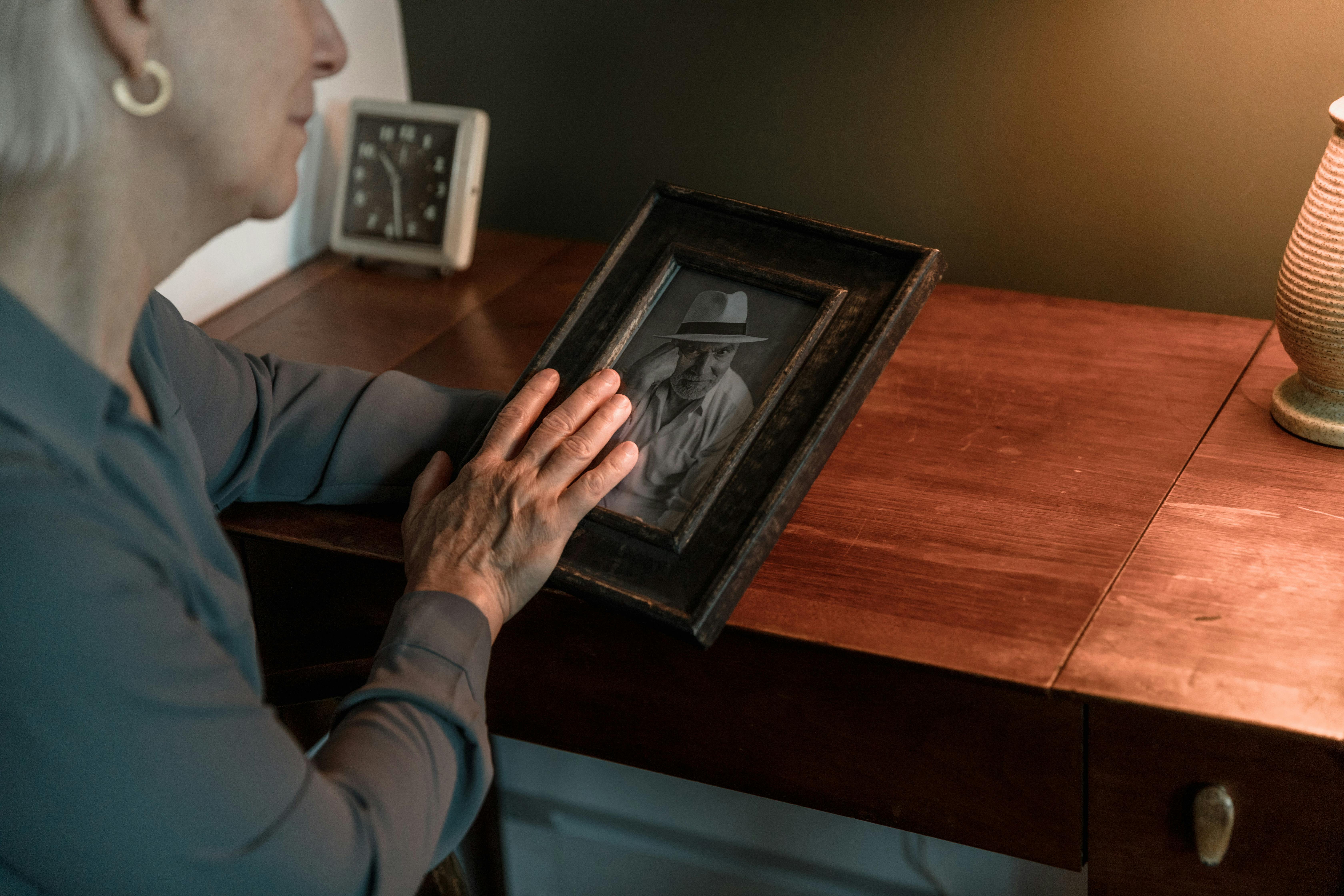
Uma mulher olhando para uma foto do marido | Fonte: Pexels
Pensei em nossos filhos, o quanto eles adoravam o pai. Eles mereciam se lembrar dele como o homem que os amava, não como a pessoa que Madison estava tentando pintá-lo para ser.
Enxuguei uma lágrima e respirei fundo.
“Adeus, Madison”, sussurrei para mim mesma. “Você não vai tirá-lo de mim.”

Uma mulher esperançosa em sua sala de estar | Fonte: Pexels
No domingo seguinte, voltei ao cemitério. Levei flores frescas e as coloquei perto do túmulo de Owen. O ar estava parado e quieto, e pela primeira vez em meses, me senti em paz.
Gostou desta história? Considere conferir esta : Quando a ex-esposa de Owen exigiu que nos livrássemos de nossos animais de estimação e móveis antes que seus filhos afastados pudessem visitá-la, as tensões explodiram. Sua tentativa de controlar nossa casa foi um passo longe demais, desencadeando uma batalha sobre limites, família e poder. Ela conseguirá criar uma barreira entre nós?
Este trabalho é inspirado em eventos e pessoas reais, mas foi ficcionalizado para fins criativos. Nomes, personagens e detalhes foram alterados para proteger a privacidade e melhorar a narrativa. Qualquer semelhança com pessoas reais, vivas ou mortas, ou eventos reais é mera coincidência e não intencional do autor.
O autor e a editora não fazem nenhuma reivindicação quanto à precisão dos eventos ou à representação dos personagens e não são responsáveis por nenhuma interpretação errônea. Esta história é fornecida “como está”, e quaisquer opiniões expressas são as dos personagens e não refletem as opiniões do autor ou da editora.



Leave a Reply